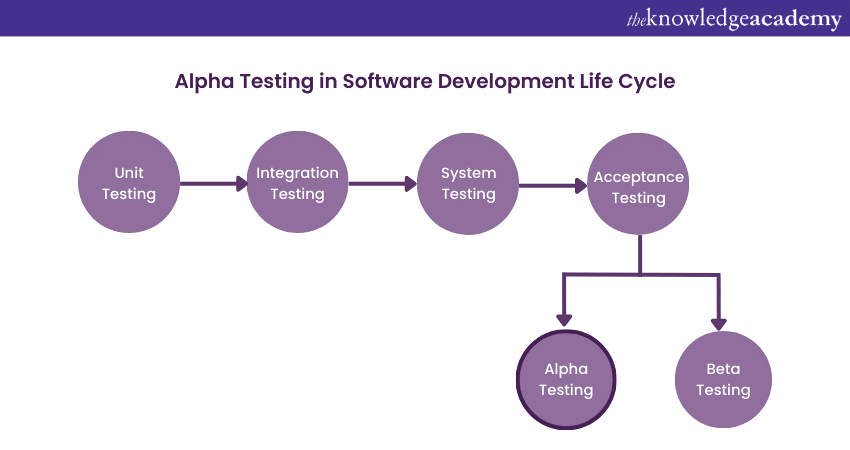We may not have the course you’re looking for. If you enquire or give us a call on 01344 203999 and speak to our training experts, we may still be able to help with your training requirements.
Training Outcomes Within Your Budget!
We ensure quality, budget-alignment, and timely delivery by our expert instructors.

In the field of software testing, the International Software Testing Qualifications Board (ISTQB) serves as a benchmark for industry standards and practices. Among its various testing methodologies, Alpha Testing in ISTQB holds a significant position.
This blog aims to provide a comprehensive understanding of Alpha Testing in ISTQB by exploring its purpose, execution, and benefits within the ISTQB framework. You will gain insights into how this testing phase contributes to delivering high-quality software products.
Table of Contents
1) Understanding Alpha Testing in ISTQB
2) Alpha Testing execution
3) Benefits of Alpha Testing in ISTQB
4) Conclusion
Understanding Alpha Testing in ISTQB
ISTQB defines Alpha Testing as a type of user acceptance testing conducted by the software development team to evaluate the software's performance, functionality, and usability in a simulated real-world environment. This testing phase focuses on identifying defects, verifying the software's compliance with requirements, and gathering valuable feedback from Alpha Testers.

What sets Alpha Testing apart from other testing phases is its early-stage execution performed by internal testers or a select group of end-users. It allows for the identification of defects before the software reaches a wider audience. Aligning this testing phase with ISTQB principles, ensures that the software meets quality standards and user expectations. Some key objectives of this testing phase are as follows:
Identifying defects: The primary objective of Alpha Testing is to identify and uncover defects or issues in the software under test. This includes functionality glitches, usability problems, and any other discrepancies that may hinder the software's performance.
Verifying compliance: Alpha Testing ensures that the software adheres to the specified requirements and meets the desired standards. It validates whether the software functions as intended and aligns with the expectations outlined during the development process.
Gathering user feedback: Alpha Testing serves as an opportunity to gather valuable feedback from Alpha Testers who represent the target end-users. Their input helps assess the software's usability, identify potential improvements, and ensure that it caters to the needs and preferences of the user base.
Learn to evaluate applications and systems with our Software Testing Training!
Alpha Testing Execution
Alpha Testing can be executed systematically within the ISTQB frameworks with certain, these execution steps for this testing phase are as follows:
Planning and preparation: Before initiating Alpha Testing, thorough planning and preparation are crucial. This includes defining clear test objectives, determining the scope of testing, and allocating appropriate resources. The test environment should be established to closely resemble the intended production environment, ensuring realistic testing scenarios.
Test execution: During the Alpha Testing phase, the selected Alpha Testers, which may include internal testers or a limited group of end-users, execute predefined test cases and scenarios. They thoroughly explore the software's features, functions, and interactions, focusing on identifying any defects or issues.
Defect management: When defects are encountered during Alpha Testing, they need to be properly managed. This involves logging and tracking defects, assigning them to the responsible parties, and monitoring their resolution. Effective collaboration and communication between testers, developers, and stakeholders play a crucial role in this process.
Documentation and reporting: Comprehensive documentation of test results, observations, and identified defects is essential during Alpha Testing. It provides a valuable reference for future analysis, improvement, and decision-making. Clear and concise defect reports facilitate effective communication between testers and stakeholders, ensuring a streamlined defect resolution process.
Get certified with our ISTQB Software Testing Foundation Course today!
Benefits of Alpha Testing in ISTQB
Alpha Testing within the ISTQB framework contributes to the successful delivery of high-quality software products. Some such benefits of this testing phase are as follows:
Early defect detection: Alpha Testing enables early identification of defects, allowing for prompt resolution before the software reaches a wider audience. This helps in reducing the cost and effort required for fixing defects in later stages of the software development life cycle.
Risk mitigation: By conducting alpha Testing, potential risks and issues can be identified and addressed proactively. This reduces the likelihood of critical failures or functional gaps when the software is deployed to the end-users.
Improved user experience: Alpha Testing involves gathering feedback from Alpha Testers who represent the target end-users. This feedback provides valuable insights into the software's usability, allowing for enhancements and refinements to be made to ensure a seamless and satisfying user experience.
Quality assurance: Alpha Testing ensures that the software meets the required quality standards and aligns with the defined specifications and requirements. It helps in verifying the software's functionality, performance, and compliance with industry best practices.
Enhanced productivity: By detecting and addressing defects early on, Alpha Testing helps streamline the software development process. It leads to improved productivity as developers can focus on developing new features and functionalities rather than spending time on fixing post-release issues.

Conclusion
Alpha Testing in ISTQB framework allows organisations can ensure early defect detection, risk mitigation, improved user experience, and overall software quality. Understanding and implementing Alpha Testing principles and practices contributes to successful software development and testing endeavours.
Gain the deep knowledge of testing process with ISTQB Advanced Level Test Manager Course!
Frequently Asked Questions
Upcoming Business Analysis Resources Batches & Dates
Date
 ISTQB Software Testing Foundation
ISTQB Software Testing Foundation
Mon 6th Jan 2025
Mon 3rd Feb 2025
Mon 17th Feb 2025
Mon 3rd Mar 2025
Mon 17th Mar 2025
Mon 31st Mar 2025
Mon 28th Apr 2025
Mon 19th May 2025
Mon 2nd Jun 2025
Mon 16th Jun 2025
Mon 30th Jun 2025
Mon 14th Jul 2025
Mon 28th Jul 2025
Mon 11th Aug 2025
Mon 8th Sep 2025
Mon 22nd Sep 2025
Mon 6th Oct 2025
Mon 20th Oct 2025
Mon 3rd Nov 2025
Mon 17th Nov 2025
Mon 1st Dec 2025
Mon 15th Dec 2025







 Top Rated Course
Top Rated Course


 If you wish to make any changes to your course, please
If you wish to make any changes to your course, please


